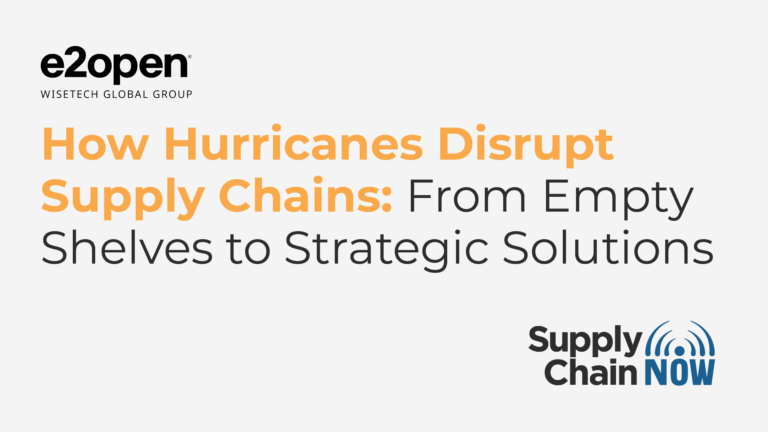
How Hurricanes Disrupt Supply Chains: From Empty Shelves to Strategic Solutions
Special Guest Blog Post written by Jeff Eckel, Director of Product Marketing, e2open
“Dad, why are they out of my favorite cereal?” your 10-year-old asks you at the grocery store, noticing that their favorite breakfast food is missing. The answer is more complex than they could imagine – hurricanes don’t just bring bad weather; they create far-reaching supply chain disruptions that affect everything from food to toys.
Each hurricane season often brings catastrophic floods and wind damage. While communities will rebuild after the devastation, supply chains – the force behind keeping stores stocked – also experience powerful shocks beyond the storms’ path.
The ripple effect of hurricanes across global trade
The impact extends well beyond the immediate devastation. Critical port hubs for global trade close as hurricanes batter coastal regions. Cargo ships carrying essential goods like food, medical supplies, and consumer products must reroute or anchor offshore, waiting for storms to pass.
This creates massive supply chain delays. Ports with backlogs of ships trying to dock and unload. Over-the-road and rail transportation networks face fallen trees, flooded roads, and damaged infrastructure that make movement difficult.
Inland distribution centers face pressure
Inland distribution centers – strategically located hubs where goods are sorted, stored, and dispatched – often become impassable after major storms. These centers serve as crucial supply chain nodes, ensuring smooth production flow from manufacturers to retailers.
But when a hurricane strikes, these facilities fill up with unmovable inventory. Stacks of goods wait patiently, unable to reach their final destinations. Retailers nationwide feel the pinch as shelves remain empty, even when a hurricane strikes thousands of miles away from their stores.
Can businesses weather the storm?
Hurricanes create situations that are difficult for brand owners, retailers, and supply chain professionals. And the key question is always: Will we have enough inventory to weather the storm until normal operations are resumed? Hurricane unpredictability, coupled with existing logistics industry challenges, makes this incredibly difficult to manage.
Real-time supply chain visibility becomes critical for a business’ survival during these disruptions. Companies with the ability to track shipments, predict bottlenecks, and coordinate with suppliers can make informed decisions and minimize impact.
For example, Covetrus, a pet health products company, can use supply chain visibility tools to identify packages headed to hurricane-affected areas, enabling them to continue to communicate updated delivery information to pet owners awaiting prescriptions for their animals.
The necessity of supply chain visibility
Supply chain visibility is a necessity when facing natural disasters like hurricanes. Without it, empty shelves become a reality for many customers.
But, with the right solutions, better visibility, and sound response strategies, supply chain professionals can build up resiliency to major disruptions. Companies that invest in comprehensive supply chain visibility can:
- Track inventory in real-time across multiple locations
- Predict potential disruptions before they occur
- Quickly reroute shipments around affected areas
- Communicate proactively with customers about delays
- Maintain better inventory positioning to weather unexpected events
Hurricane seasons over the last few years have demonstrated that extreme weather events are becoming more frequent and severe. Businesses must build resilience into their operations from the ground up, and not treat weather disruptions as rare occurrences.
Building resilient supply chains
As climate change intensifies weather patterns, companies must develop strategies that go beyond traditional risk management, incorporating real-time visibility, predictive analytics, and flexible response tactics.
If you’re interested in learning how supply chain visibility solutions can help your business mitigate hurricane or other disruptions, feel free to contact us!
As Director of Product Marketing for e2open, Jeff Eckel is focused on solutions that help clients collaborate across all tiers of supply and manufacturing. With over 20 years of experience in supply chain business intelligence, Jeff has a deep understanding of supply chain management business processes. He specializes in translating complex business challenges into an end-to-end understanding of tangible business value. In his career, Jeff has held a variety of roles including product marketing, product management, solution consulting, and professional services. He is located in Austin, TX, and enjoys spending time with his kids outside of work.
More Blogs

Nothing Can Mask the Need for Protection for Health Care Workers

